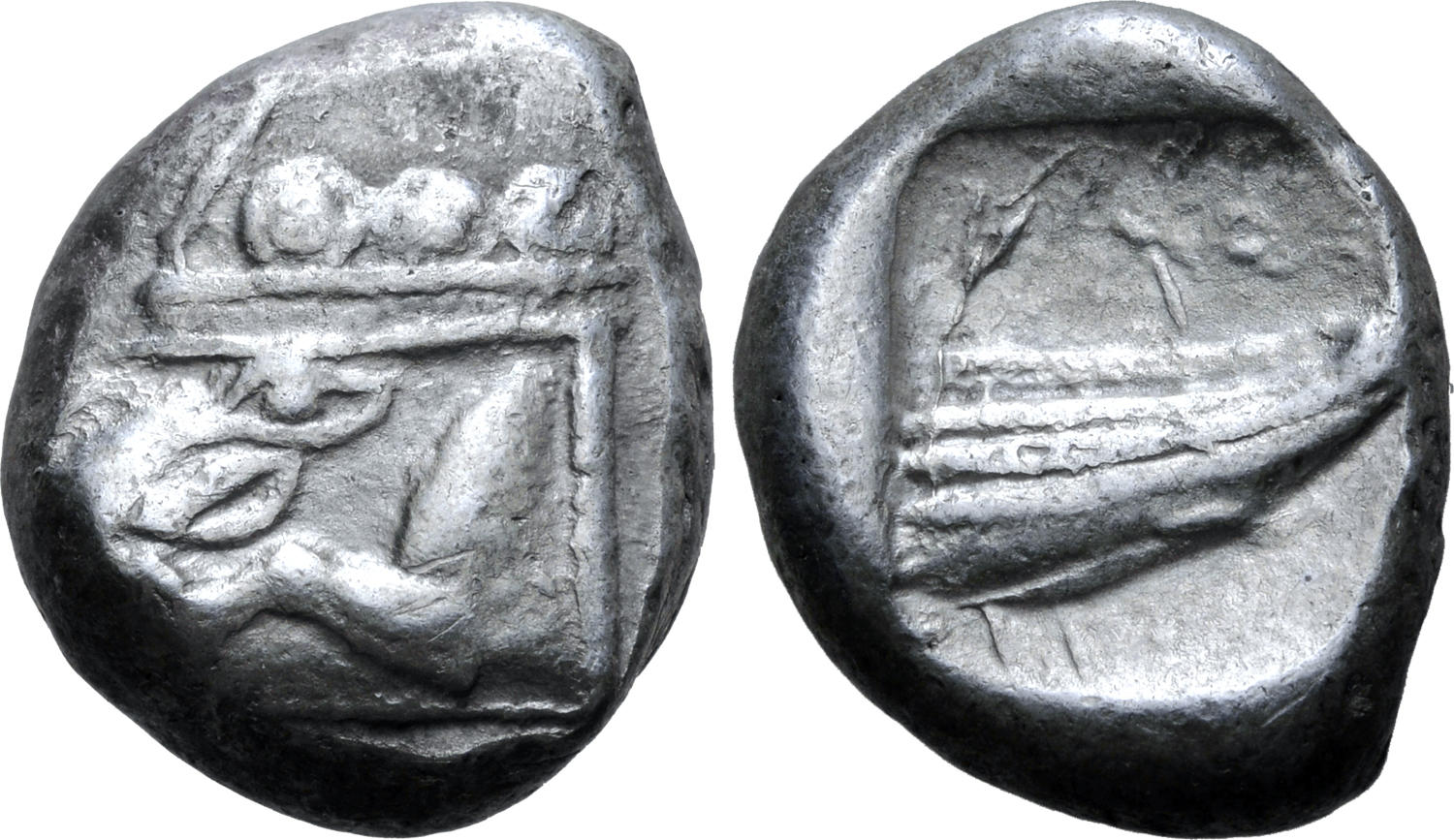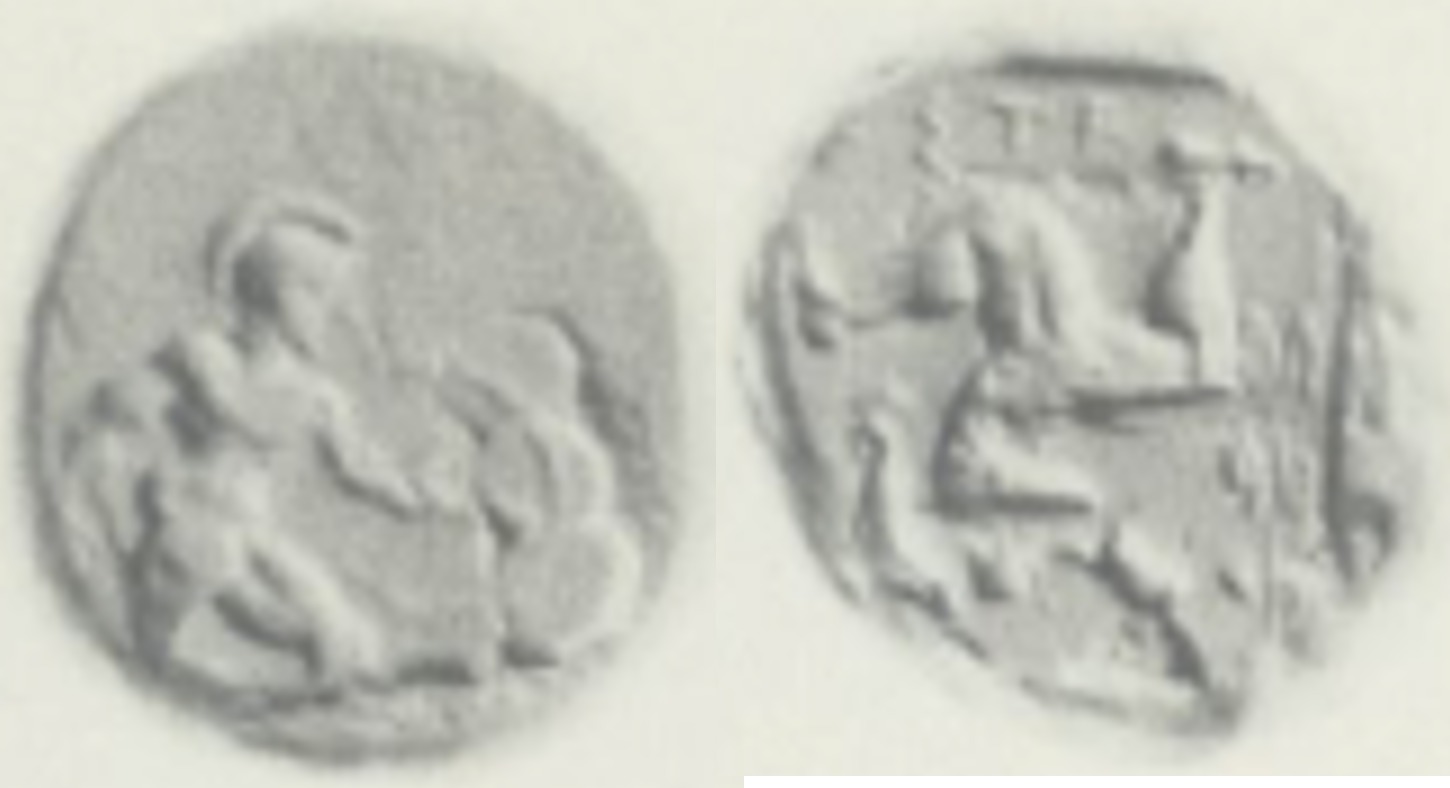2360 - Aspendus (double siglos hoplite/triskeles) over Phaselis (prow/incuse square) (Kraay 1969, pl. XVI, 2): Difference between revisions
From SILVER
No edit summary |
|||
| Line 20: | Line 20: | ||
|Coin series reference=BMC Lycia, Aspendos, p. 94, n° 8 ; Babelon 1901, Part 2, Tome 1, p. 526-530, n° 862 ; SNG Copenhagen Lycia-Pamphylia, n° 177-178 ; Kraay 1969, p. 15-16, n° 6, 1, pl. XVI, n° 2; SNG von Aulock Pamphylien, n° 4481 ; SNG France 3, n° 11 | |Coin series reference=BMC Lycia, Aspendos, p. 94, n° 8 ; Babelon 1901, Part 2, Tome 1, p. 526-530, n° 862 ; SNG Copenhagen Lycia-Pamphylia, n° 177-178 ; Kraay 1969, p. 15-16, n° 6, 1, pl. XVI, n° 2; SNG von Aulock Pamphylien, n° 4481 ; SNG France 3, n° 11 | ||
|Coin series web reference=https://greekcoinage.org/iris/id/aspendus_babelon_1907_855-67 | |Coin series web reference=https://greekcoinage.org/iris/id/aspendus_babelon_1907_855-67 | ||
|Overstruck obverse description=Prow terminating in a boar’s forepart, with 3 shields | |Overstruck obverse description=Prow terminating in a boar’s forepart, with 3 shields | ||
|Overstruck reverse description= | |Overstruck reverse legend=ΦAΣ | ||
|Overstruck reverse legend language=Greek | |||
|Overstruck reverse description=Stern of galley to right, all within incuse square | |||
|Overstruck mint=Phaselis | |Overstruck mint=Phaselis | ||
|Overstruck ancient region=Lycia | |Overstruck ancient region=Lycia | ||
Revision as of 04:53, 12 August 2023
463 BCE - 430 BCE | ΕΣΤ
Images
Overstruck variety

Phaselis 3 globules.jpg [1]
Location/history
| Sale(s)Sale(s) ᵖ: | Spink | |
Overstriking coin
Description
| ObverseInscription or printing placed on the obverse.: | Warrior walking right, naked, wearing helmet, holding spear in right hand, shield attached on left arm. | ReverseInscription or printing placed on the reverse.: | ΕΣΤ (Greek) Triskeles of human legs within incuse square. Rooster to left in left field. Branch of laurel in right field. |
Mint and issuing power
| MintIdentifies the place of manufacture or issue of a numismatic object.: | Aspendus | Ancient regionAncient region. | Pamphylia | Modern countryModern country: Turkey | AuthorityIdentifies the issuing power. The authority can be "pretended" when the name or the portrait of X is on the coin but he/she was not the issuing power. It can also be "uncertain" when there is no mention of X on the coin but he/she was the issuing power according to the historical sources: | Persian Empire |
Chronology
| FromIdentifies the initial date in a range assigned in a numismatic context. 463 BCE toIdentifies the final date in a range assigned in a numismatic context.. 430 BCE | Classical 480-323 BC |
Physical description
| MetalThe physical material (usually metal) from which an object is made.: Silver |
DenominationTerm indicating the value of a numismatic object. Examples: tetradrachm, chalkous, denarius.: double siglos |
||
| StandardStandard.: Persian | |||
References
| Coin referenceReference of the Coin: | Kraay 1969, p. 15-16, n° 6, 1, pl. XVI, n° 2 | Coin series referenceReference to coin series study: | BMC Lycia1BMC Lycia, Aspendos, p. 94, n° 8, Babelon 19012Babelon 1901, Part 2, Tome 1, p. 526-530, n° 862, SNG Copenhagen Lycia-Pamphylia3SNG Copenhagen Lycia-Pamphylia, n° 177-178, Kraay 19694Kraay 1969, p. 15-16, n° 6, 1, pl. XVI, n° 2, SNG von Aulock Pamphylien5SNG von Aulock Pamphylien, n° 4481, SNG France 36SNG France 3, n° 11 |
| Coin series web referenceCoin series web references: | |||
Overstruck type
Description
| ObverseInscription or printing placed on the obverse.: | Prow terminating in a boar’s forepart, with 3 shields | ReverseInscription or printing placed on the reverse.: | ΦAΣ (Greek) Stern of galley to right, all within incuse square |
Mint and issuing power
| MintIdentifies the place of manufacture or issue of a numismatic object. ᵖ: | Phaselis | Ancient regionAncient region. ᵖ | Lycia | Modern countryModern country: Turkey | AuthorityIdentifies the authority in whose name (explicitly or implicitly) a numismatic object was issued. ᵖ: |
Chronology
| FromIdentifies the initial date in a range assigned in a numismatic context. 520 BCE toIdentifies the final date in a range assigned in a numismatic context.. 500 BCE | Archaic until 480 BC |
Physical description
| DenominationTerm indicating the value of a numismatic object. Examples: tetradrachm, chalkous, denarius. ᵖ: | stater |
References
| Coin type referenceReference to coin series study ᵖ: | SNG von Aulock Lykien7SNG von Aulock Lykien, 4391, Heipp-Tamer 19938Heipp-Tamer 1993, n° 3 | ||
| Coin series web reference overstruckCoin series web references overstruck: | |||
Additional data
| Frequency of overstrikesFrequency of overstrikes: | frequent | Level of confidenceLevel of confidence of the identification: | sure |
| RemarksRemarks: | |||
References
- ^ Hill, George Francis (1897), A Catalogue of the Greek coins in the British Museum. vol. XVIII : Lycia, Pamphylia, Pisidia, London, The Trustees, p. 353, pl. 44.
- ^ Babelon, Ernest (1901), Traité des monnaies grecques et romaines. Tome Premier. Première partie, théorie et doctrine, Paris, E. Leroux
- ^ Breitenstein, Niels (1955), Sylloge Nummorum Graecorum: Royal Collections of coins and medals. Danish National Museum, 31, Lycia-Pamphylia.
- ^ Kraay, Colin M. (1969), "Fifth century overstrikes at Rhegium and Messana", in La circolazione della moneta ateniese in Sicilia e in Magna Grecia : atti del I Convegno del Centro internazionale di studi numismatici, Napoli, 5-8 aprile 1967, Roma, p. 141-150, pl. 12.
- ^ Sylloge Nummorum Graecorum. Sammlung v. Aulock. Pamphylien. 11 Heft (n° 4477-4893), Berlin, 1965.
- ^ Levante, Edoardo [with the collaboration of Peter Weiss] (2001), Sylloge nummorum graecorum. France. 3, Département des monnaies, médailles et antiques : Pamphylie, Pisidie, Lyaconie, Galatie, Paris-Zürich, Bibliothèque nationale de France-Numismatica Ars Classica, XXXIV + 293 p. and 146 pl.
- ^ Sylloge Nummorum Graecorum. Sammlung v. Aulock. Lykien. 10 Heft (n° 4041-4876), Berlin, 1964.
- ^ Heipp-Tamer, Christine (1993), Die Münzprägung der lykischen Stadt Phaselis in griechischer Zeit, Saarbrücken, 182 p., 32 pl.
